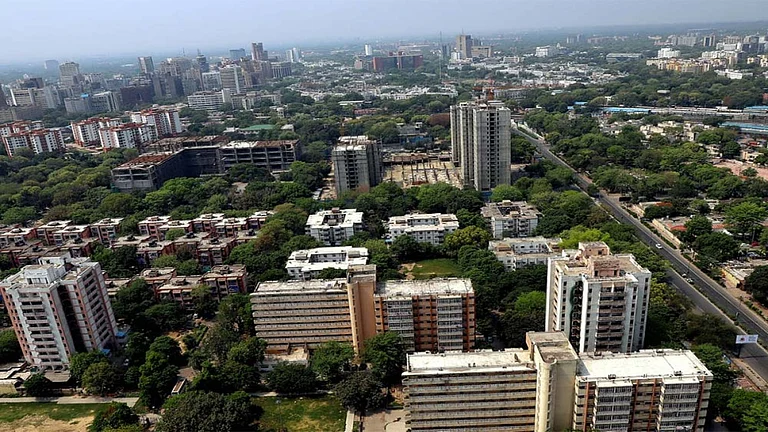At an annual congregation of the who's who of Bengaluru's tech ecosystem late last year, a top Karnataka minister announced that the state was setting its sights on second-tier cities to build a more distributed innovation ecosystem. The implications were clear.
Karnataka, long synonymous with Bengaluru’s tech dominance, was actively pushing to develop start-up clusters beyond the already-saturated Silicon Valley of India.
Of course, it won't be easy. But the state has the ingredients to make it happen—significant high-tech exports and a thriving services sector—factors that give it an overall score of 79.6 and first place among states for macroeconomic performance in the Outlook Business Outperformers 2024.
And backed by policy shifts in infrastructure and human capital investments, the government is crafting a blueprint to decentralise growth and and position Tier-II cities as the next frontier of India’s digital economy.
Pioneering Policies
In 2015, Karnataka became the first state in the country to announce a multi-sector start-up policy. Under this, the state set up a start-up council, chaired by the chief minister, to conduct annual reviews. Scrutiny at the highest level ensured that the policy was effectively implemented.
“Being an IT [information technology] sector hub, the state automatically becomes an attraction for entrepreneurs and investors. Karnataka is a leader in FDI [foreign direct investment], having attracted $51.03bn between 2019 and 2024. Industry-friendly initiatives by the state enable innovation and attract investments,” says Dharmender Jhamb, partner, fintech and IT policy, Grant Thornton Bharat, a consultancy.
Since its emergence as a global technology hub in the mid-1990s, Bengaluru has drawn entrepreneurs seeking access to capital and networks.
“Most early-stage VC [venture capital] firms have offices here. Many ex-founders from Bengaluru have turned into angel investors—both help in creating a good investment ecosystem. There are role models like Flipkart and Swiggy and their founders and ex-employees,” says Subramanya SV, co-founder, Fisdom, a fintech start-up headquartered in Bengaluru.
Over the years, the state has developed a nuanced approach to fostering innovation through sector-specific schemes. For instance, the Karnataka Information Technology Venture Capital Fund (Kitven) provides critical funding support to emerging IT companies. Among its flagship initiatives is the Bio-Venture Fund, which focuses on investments in biotechnology and allied sectors
Then there is Elevate Unnati, developed in partnership with the social-welfare department. The programme aims to democratise access to the start-up ecosystem and encourages Scheduled Caste and Scheduled Tribe entrepreneurs to scale up their product or solution.
Focus On Hinterland
“One very interesting initiative by the state government, which started about five years ago, is establishing a PPP [public-private partnership] model called the Karnataka Digital Economy Mission, and [under] it, the Beyond Bengaluru initiative. KDEM has created the structure of a cluster seed fund in Mysuru, Mangaluru and Hubballi-Belagavi,” says Madan Padaki, entrepreneur and president of TiE Bangalore, a global non-profit to foster entrepreneurship.
The Rs 25 crore Beyond Bengaluru cluster seed fund supports entrepreneurs in these key regionsand hopes to have nurtured 10,000 start-ups by 2030.
Now, as Karnataka seeks to usher in the next phase of growth, the focus is shifting towards this ecosystem. Emerging clusters in Kalaburagi, Belagavi, Dharwad, Mangaluru, Shivamogga, Mysuru and Tumakuru are rapidly gaining traction as attractive destinations for both domestic and global investment.
Due to their strategic locations, incubation infrastructure and connectivity, these towns are becoming the new preference for founders across industry verticals.
“What we are trying to figure out in each of these clusters is can we create similar access to talent, access to markets and access to VCs so the need for entrepreneurs to come to Bengaluru is reduced,” says Padaki.
Not All is Rosy
Meanwhile, in Bengaluru, start-up founders are grappling with challenges that threaten their growth trajectory. Traffic congestion and inadequate public transport impact the productivity of employees. Added to this is the problem of limited affordable office space and escalating real estate costs.
The uneven distribution of talent across the state is another challenge. Despite the government’s initiatives, the majority of premier educational institutions and research centres are in Bengaluru, exacerbating the reliance on a limited talent pool.
But perhaps Bengaluru’s biggest challenge yet is balancing the exponential rise in the start-up ecosystem with sustainable development. Experts say that though initiatives to foster innovation hubs outside the capital are gaining momentum, the state needs a more cohesive strategy.
For the time being, the state is working to make its environment more conducive for start-ups at the growth stage. And as India aims to democratise its start-up boom across the nation, Karnataka’s model could serve as a blueprint for other regions aspiring to broaden their entrepreneurial base.












